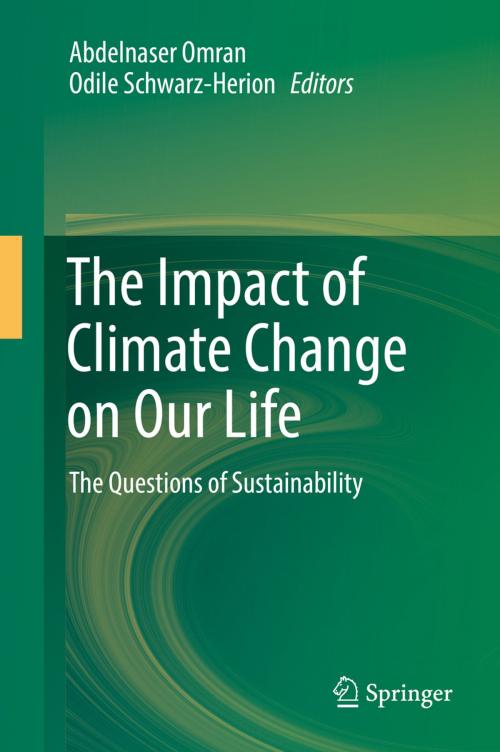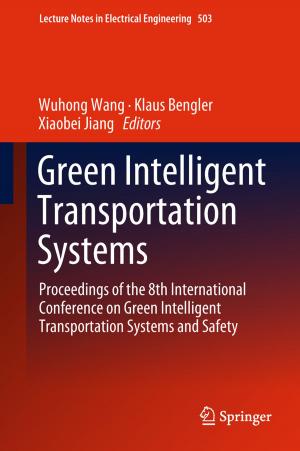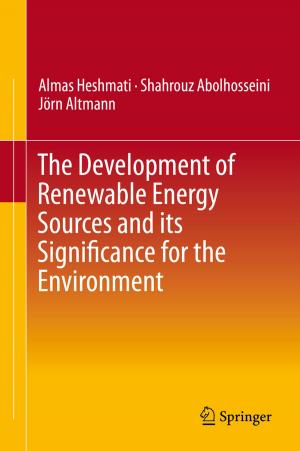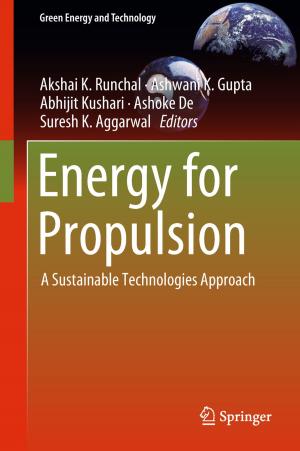The Impact of Climate Change on Our Life
The Questions of Sustainability
Nonfiction, Science & Nature, Science, Biological Sciences, Environmental Science, Earth Sciences, Nature| Author: | ISBN: | 9789811077487 | |
| Publisher: | Springer Singapore | Publication: | February 23, 2018 |
| Imprint: | Springer | Language: | English |
| Author: | |
| ISBN: | 9789811077487 |
| Publisher: | Springer Singapore |
| Publication: | February 23, 2018 |
| Imprint: | Springer |
| Language: | English |
This book introduces the highly topical issue from many different angles, sensitizing readers to the various challenges to human life posed by climate change, identifying possible intentional and inadvertent anthropogenic factors and consequences, and seeking socially and environmentally viable solutions. The book begins by examining the impact of the climate change discussion on science, politics, economy and culture – from its historical origin in the first Club of Rome Report and its inclusion in the UN's SDGs to the Paris Agreement and beyond. Comprising 12 chapters, it analyses the factors which caused the catastrophic 2014 Kelantan flood in Malaysia, focusing on the Kuala Krai district and discusses mud architecture in Wadi Hadramout, Yemen and mitigating the expected effects of climate change on this unique architecture and cultural heritage. It also examines the economic costs of climate change on health and the increased burden on individual expenditures and national health systems. The role of climate change in the water-energy nexus and efforts to increase efficiency in energy and water end-use to increase Queensland’s agricultural sector’s resilience in Australia is addressed, as is water security and climate change issues in developing countries and the potential of partnership procurement strategies for managing sustainable urban water supply in Nigerian cities.
It also includes a chapter offering a new approach to waste management, exploring to what extent waste can complicate our daily actions and influence environmental decay, and recommending that renewable materials be sorted and separated from other types of materials to avoid cross-contamination, to increase the value of the materials, and to ease the process of manufacturing. Subsequent chapters identify factors sustaining the municipal solid waste management and practices in Ajdabiya city in Libya, and look at accounting disclosure remedies by exploring areas in which sustainability reporting could expand beyond corporate environmental reporting to additional disclosures, curbing recklessness in pursuing merely economic goals. The book shows – from the perspective of agriculture – how human activities can increase the negative impacts of climate change on lifestyle in Malaysia, suggesting alternative lifestyles and encouraging international cooperative efforts. The last chapters evaluate the impacts of various environmental factors on the local tourism sector in Pakistan, and discuss strategies to tackle climate change, focusing on the opportunities and risks of climate engineering. Since these risks encompass inadvertent negative effects and targeted abuse for covert weather warfare and terrorism that violate the UN’s ENMOD convention, the author recommends viable alternatives to deal with climate change.
This book introduces the highly topical issue from many different angles, sensitizing readers to the various challenges to human life posed by climate change, identifying possible intentional and inadvertent anthropogenic factors and consequences, and seeking socially and environmentally viable solutions. The book begins by examining the impact of the climate change discussion on science, politics, economy and culture – from its historical origin in the first Club of Rome Report and its inclusion in the UN's SDGs to the Paris Agreement and beyond. Comprising 12 chapters, it analyses the factors which caused the catastrophic 2014 Kelantan flood in Malaysia, focusing on the Kuala Krai district and discusses mud architecture in Wadi Hadramout, Yemen and mitigating the expected effects of climate change on this unique architecture and cultural heritage. It also examines the economic costs of climate change on health and the increased burden on individual expenditures and national health systems. The role of climate change in the water-energy nexus and efforts to increase efficiency in energy and water end-use to increase Queensland’s agricultural sector’s resilience in Australia is addressed, as is water security and climate change issues in developing countries and the potential of partnership procurement strategies for managing sustainable urban water supply in Nigerian cities.
It also includes a chapter offering a new approach to waste management, exploring to what extent waste can complicate our daily actions and influence environmental decay, and recommending that renewable materials be sorted and separated from other types of materials to avoid cross-contamination, to increase the value of the materials, and to ease the process of manufacturing. Subsequent chapters identify factors sustaining the municipal solid waste management and practices in Ajdabiya city in Libya, and look at accounting disclosure remedies by exploring areas in which sustainability reporting could expand beyond corporate environmental reporting to additional disclosures, curbing recklessness in pursuing merely economic goals. The book shows – from the perspective of agriculture – how human activities can increase the negative impacts of climate change on lifestyle in Malaysia, suggesting alternative lifestyles and encouraging international cooperative efforts. The last chapters evaluate the impacts of various environmental factors on the local tourism sector in Pakistan, and discuss strategies to tackle climate change, focusing on the opportunities and risks of climate engineering. Since these risks encompass inadvertent negative effects and targeted abuse for covert weather warfare and terrorism that violate the UN’s ENMOD convention, the author recommends viable alternatives to deal with climate change.















